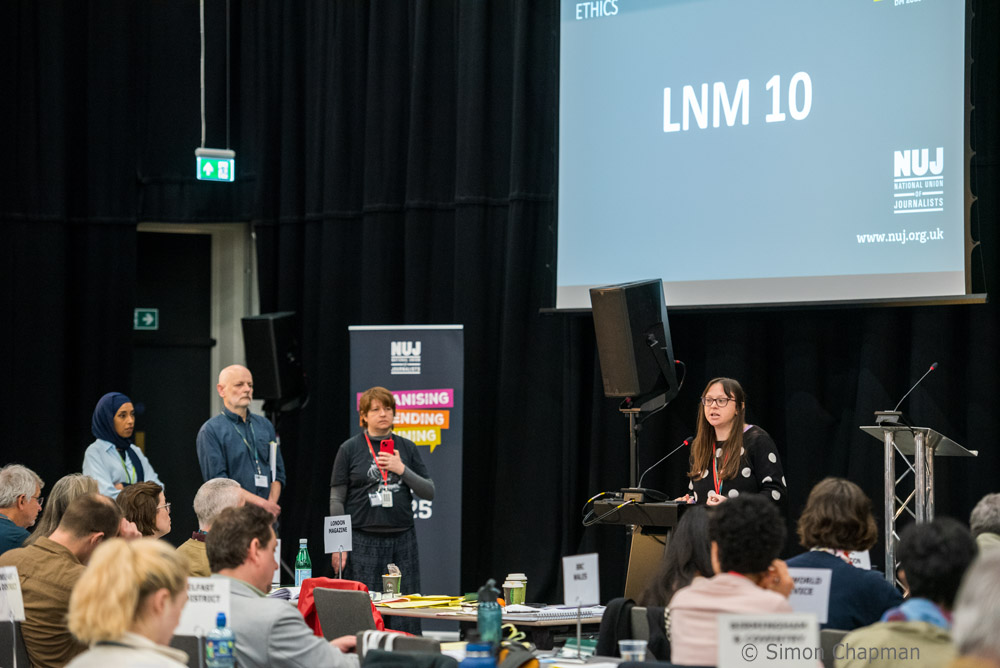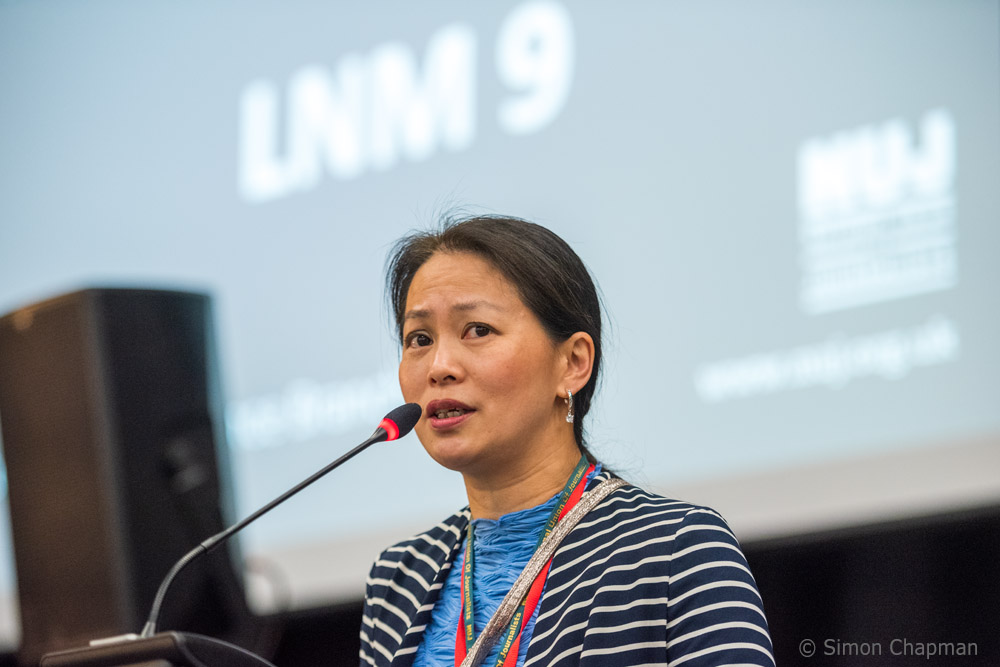
A LARGE delegation of members from the South West of England – most of them first-timers at the event – attended the NUJ’s biennial conference in Blackpool, where each one made a significant contribution to the debates.
Yue He Parkinson, who is based in the SW but who writes regularly for FT China, told the Delegate Meeting (DM) that President Trump had seriously impacted her work through his cuts to public service. The conference heard that savage cuts to USAID have affected hundreds of media organisations around the world, many of them devoted to public service or democracy. Yue is no longer invited to appear on Voice of America – and she knows another Chinese journalist who has been similarly affected.


The conference overwhelmingly passed a SWE motion condemning Trump’s cuts to the media and instructing the union to lobby parliamentarians to work against the moves.
Andrew Lee, former owner of Somerset news outlet The Leveller, and now editor of Somerset Confidential, was also successful in persuading delegates to back a SWE motion urging the union to seek out members in places where media workers may not have encountered the union – such as independent media and digital ventures. The NUJ will now pursue hard-to-reach potential members through social media campaigns.
Alex Morss and Yvonne Deeney jointly presented a motion citing criticism of Gaza coverage by the BBC and other public sector media. As with other debates on Gaza, this drew an impassioned discussion. BBC delegates said they felt their integrity was being called into question. Alex and Yvonne said the criticism was not personal, and the motion sought increased support to whistleblowers. The vote was lost, though several other motions condemning Israeli attacks on journalists on Gaza were passed – more on the NUJ website.

Ray Tostevin, the leader of the delegation and, like Yue and Andrew, a first-time delegate, presented motions slamming Facebook for ending fact-checking and calling on the union to take more action to safeguard members’ interests from AI. Both motions were passed convincingly.
The length of the debates on Gaza meant that there was no time to debate two other SWE motions, though both will now be carried out by the union’s National Executive Council (NEC). One, written by SWE member and long-time internationalist Mike Jempson, called attention to the plight of journalists exiled from the dictatorship in Belarus. All independent reporting has been outlawed by Belarus, where dissent in the media is punished by imprisonment. The SWE branch has made a donation to the exiled Belarus Association of Journalists in Lithuania, and is urging other branches to do the same.
Yue He Parkinson was disappointed not to get a chance to present her motion on the plight of Chinese journalists who work abroad, many of whom fear that if their work is seen as critical of the Chinese state, their families at home will be persecuted. The motion also outlined support given to exiled Hong Kong journalists. Like the Belarus motion, this work will be passed to the NEC to carry out.
Three members of the SWE branch are members of the NEC – Simon Chapman, Paul Breeden and Christina Zaba. Between them they have been to more DMs than Donald Trump has bought bottles of hair dye, and they were kept pretty busy, making sure the delegates knew where they should be, attending meetings and speaking on behalf of the NEC.
Here are the impressions of some of our delegates on their first DM:
Ray Tostevin Thirty seven years after joining the NUJ as a BBC Radio Devon reporter, how did it take SO long to get to my first DM??
Blackpool 2025 by the sea. How wonderful! How refreshing!! This DM certainly met the brief: three days of intense, high-octane debate and discussion, leading at times to full-scale rows over some contentious issues, including media coverage of Gaza; trans rights; and is AI really destroying jobs and taking over the world?
Of course, it was always going to be like that. Whenever a crowd of journalists are decanted into a darkened room (with or without alcohol/strong coffee to fuel discussion), verbal squabbles and disagreements are guaranteed. In the event, Blackpool 2025 was a revelation. Yes, the Delegate Agenda was lengthy and detailed. Ditto, the Delegate Report. The daily schedules (order papers) were confusing and hard to get your head around; constantly referring to the motion to be “moved”. Or “moved as amended”. If delegates complained about a particular motion, it might be “remitted” (withdrawn from debate, on the understanding the NEC will act on it).
Heading home to Somerset on Sunday afternoon, it was great to continue conversations started in Blackpool… I can honestly say, to steal a phrase, I have found my tribe. People who will challenge, not just accept things as they are. But how they might be. One challenge we all face is recruitment. How best to engage sceptical colleagues. How best to show them that being an active part of the NUJ, can be an invigorating journey of discovery. Here’s to the next steps.
Andrew Lee My overwhelming impression of my first DM was the mountain of paper. Two very thick books each with a specific but different purpose were challenging enough – come on be honest, how many delegates had read every page of each volume?
But then when we arrived more papers were waiting to greet us. Yellow papers, pink papers and finally green papers.
Sorting between this mountain of paper was at times a little daunting. Remembering what each colour stood for, remembering in fact what the content of the 150-ish motions actually said in advance of the debate on them and then which way, if any, our branch had said we should vote.
At times I lost my way, lost the plot, lost the will to live. Yet bizarrely with the help of the experienced NEC members from our patch to guide us it all slotted into place. I’m not quite sure how it happened, but it did, and strangely enough, it all started to make sense.
As the motions rose and fell, you learned the protocol. Never having seen the room before, two mics and two podiums sounded vaguely like overkill until you got into the room and saw how they worked.
The animated nature of some of the debates was inspiring. Aside from one or two disappointing lapses, the standard of debate was high, the courtesy extended between the parties appropriate.
Of course there’s a lot of talking and when arriving on Sunday morning there were some five papers still to go, either in full or in part, it seemed as if the talking had been overdone.
But no, once again practicality and efficiency rode to the rescue. Speaking times were cut. Delegates encouraged to be prepared to move to the mic as soon as their turn arrived.
Time limits, instead of being loosely controlled as had been the case for the past couple of days, were suddenly ruthlessly enforced. Turning the mic off can work wonders on an over-enthused speaker who has overstayed their allotted moment.
Every motion was debated or at least heard and voted on. True, the NEC agreed to take on a couple of more complex ones without debate, but only with the agreement of the delegates who were down to put the motions.
I approached the whole event with apprehension. By the time it was over I think I pretty much understood it and discovered, to my surprise, that I’d really enjoyed it.
Yue He Parkinson Attending the national conference was an amazing experience. I didn’t have any expectations as I had no idea what it was about. I noticed my colleagues have spent so much effort to amend the wording of our motions, yet didn’t see the way I could contribute, except for our branch motion on Hong Kong and China. Yet three factors have motivated me to be more active in the future meetings of the NUJ.
1. I have built up a general idea about what the conference is about. After watching and voting for the motions, I have an idea how to move my own motion for the future.
2. As the mover of our motion on Trump’s cuts to USAID and their effect on the media, I enjoyed my virgin speech. I was overwhelmingly encouraged by the rewarding aftermath from the delegates whom I met in toilet, lift, gala dinner, reception, etc, when they came to me specifically to give me a compliment. I am now expecting my next speech in two years time in Brighton.
3. The support from Steve Bird, the chair of the FT chapel, regarding my pay rise issue with FT Chinese, which was sorted out in 48 hours! This proved to me that the union is behind me when I need help. I thank Paul for introducing me to Steven hugely.
In general, it’s an eye-opening and inspiring experience. I felt lucky to be a part of the NUJ.
For more reports on debates and decisions at DM 2025, see the NUJ website.